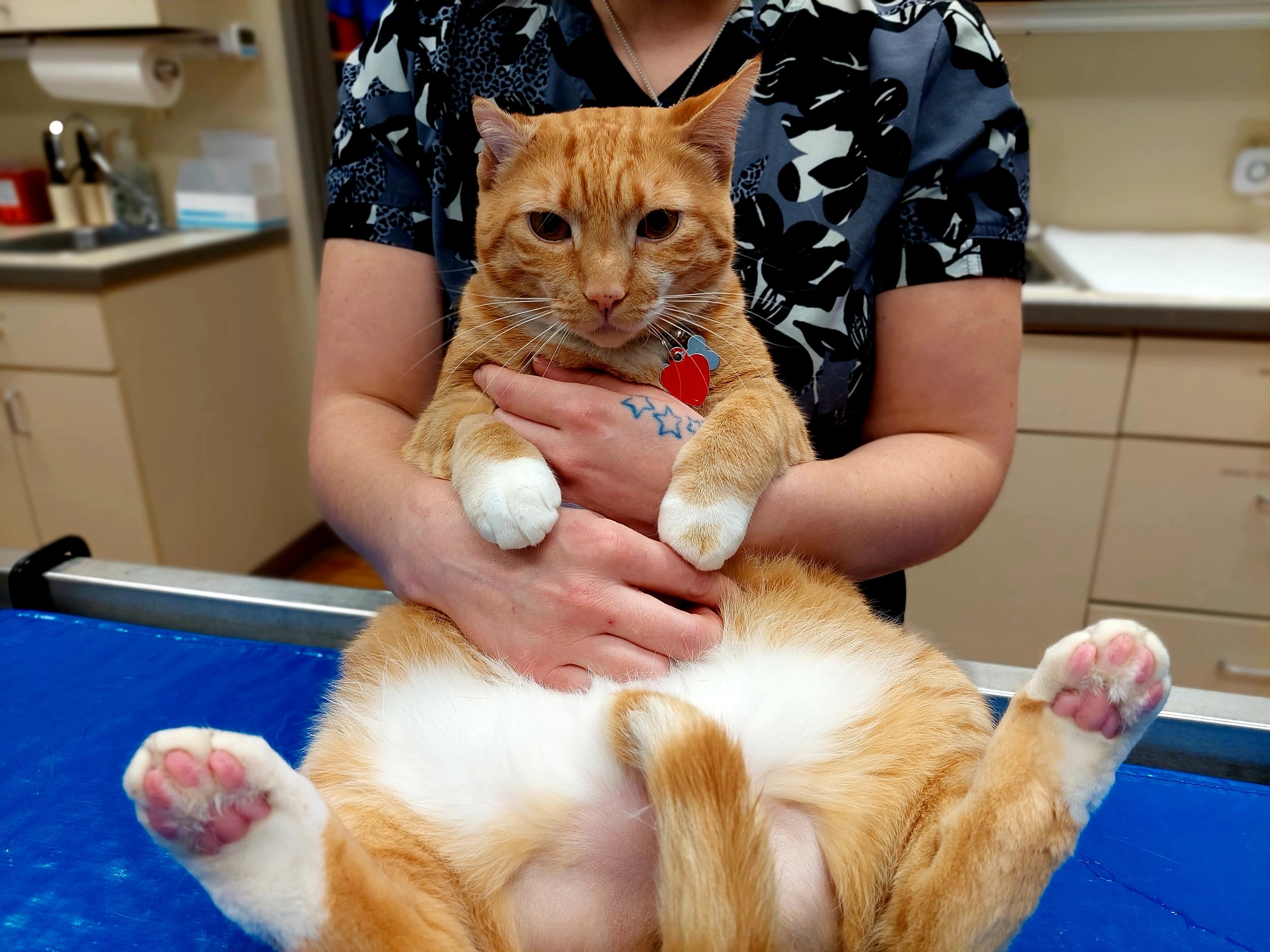
New Kitten Care Guide
Congratulations on your new kitten! There can be a lot of information to take in about caring for your new pet, but we are here to help!
1. Vaccinations and Viral Diseases
FVRCP vaccine: We recommend the first dose be given at 7-8 weeks, the second dose be given at 11- 12 weeks, and the third dose be given at 15-16 weeks old. After a booster in one year, this vaccine is repeated every 3 years.
Rabies vaccine: Rabies vaccine is recommended for all cats. Most exposure to the Rabies virus in this area occurs indoors from bats. The first vaccine is given when the kitten is at least 15-16 weeks of age and boosters are annual.
Feline leukemia virus (FeLV): This contagious retrovirus is a leading cause of death in cats. It is transmitted from cat to cat by licking or biting and may be passed from the mother cat to her kittens during pregnancy. We recommend that all cats be tested for FeLV. Strictly indoor cats do not require FeLV vaccinations. FeLV vaccine is given in a series of two injections 3-4 weeks apart followed by a yearly booster.
Feline immunodeficiency virus (FIV): This is another retrovirus, and is in the same class as the human AIDS virus. We recommend all new cats be tested for FIV. This virus causes an immune deficiency syndrome in cats and is primarily spread by bite wounds. FIV vaccine is available but is not recommended.
Feline infectious Peritonitis (FIP): FIP is a viral disease of cats that, once contracted, is almost invariably fatal. A nasal drop vaccine is available but its efficacy is controversial. We do not recommend FIP vaccination. There are new drugs available for the treatment of FIP.
2. Diet
Most cats can eat either a wet or dry diet, but we do not recommend a raw diet.
Whatever form of diet is fed, it is best to meal feed. Cats fed dry food free choice frequently become obese, which can lead to health consequences.
As far as brands are concerned, we would recommend selecting major recognizable brand names like Science Diet, Royal Canin or Purina. Science Diet Oral Care is helpful in preventing dental disease in adult cats.
Check that any food you purchase is AAFCO approved.
3. Litter Box
Most kittens take to the litter box naturally. Either scoop type litter or clay litters are acceptable. With the scoop litters, both urine and feces are scooped away and disposed of daily. Clay litters should be completely changed every few days as the urine will saturate the litter.
We do not recommend the scented litters because some cats are sensitive to the chemicals they contain.
It may be necessary to experiment with different types of litter as some cats may have preferences.
The litter box should be located reasonably close to where the cat spends his/her time, but not too close to the food. There should be one litter box per cat up to a reasonable number.
4. External Parasites (fleas)
We sell two types of flea/tick prevention for cats: Revolution and Bravecto. Bravecto Plus is topically applied every 2 months to cats 6 months and older.
Revolution is a monthly, topical prevention that is typically recommended for young kittens.
5. Internal Parasites (worms)
We recommend routinely deworming your kitten. This is done at the time of the initial vaccination visits. A fecal analysis should also be done to check for other parasites.
Keeping your kitten on a monthly flea prevention will also help with the prevention of some internal parasites.
6. Spaying and Neutering
Spaying a cat prior to the first heat cycle will minimize the chances of mammary cancer in the older cat. We recommend male cats be neutered at 5-6 months of age.
Almost all cat owners neuter male cats to help prevent spraying, roaming, fighting etc. We recommend male cats not intended for breeding be neutered at 6-9 months of age.
7. Identification and Microchipping
We recommend some kind of identification for all pets.
We offer Home Again microchipping. This is a simple injection of a small, rice-sized chip that will be linked to your personal information. It is universal, so any vet or shelter in the US can scan the microchip and contact you should your pet be missing.
Most pet owners opt to have the microchip placed at the time of a spay/neuter procedure, but it can be completed at any time.
8. Dental Care
Many veterinarians feel that “appropriate dental care is the most important thing you can do to enhance and lengthen the quality of your pet’s life.”
Periodic, professional cleanings are necessary for most cats. We will check the condition of your cat’s oral cavity and recommend appropriate care at your regularly scheduled exam.
NOTE: Regular dry food does not clean your cat’s teeth.
9. Cat Toys
There are many varieties of commercial toys available for cats and most of the time, these are fine.
Ribbons, hair ties, and other linear objects can cause serious problems when ingested by your cat should be avoided.
10. Training
Cats are very intelligent animals who typically enjoy their independence but this does not mean they cannot be taught!
Put your food away so there will be no added incentive to get on the table.
Use positive reinforcement with verbal praise and petting for desired behavior helps. Food treats can be helpful.
Cats do not respond well to physical punishment; this is likely to cause more problems than it solves. Some cats respond to being squirted with water from a squirt gun. It is important that the cat not associate you with the water, so don’t let it see you doing this if possible.
Scratching posts should be introduced immediately, as your cat must scratch on something. Catnip and positive reinforcement encourage this natural requirement.
